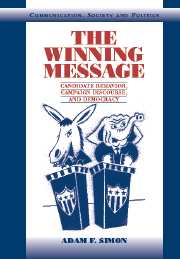Book contents
- Frontmatter
- Contents
- List of Figures
- List of Tables
- Acknowledgments
- 1 Introduction
- 2 Dialogue: A Standard for Campaign Discourse
- 3 Understanding Campaigns: Background, Theory, and Methods
- 4 The Ventriloquist's Hand: A Game-Theoretic Model of Campaigns
- 5 Duck or Punch? Dialogue in a California Gubernatorial Election
- 6 Dialogue and Its Effects in Contemporary American Elections
- 7 Explaining and Predicting the Occurrence of Dialogue
- 8 Conclusion: Toward More Substantive Campaign Discourse
- Appendix A Analysis of the Model of Campaigns in Mass Elections
- Appendix B Experimental Procedures
- References
- Index
8 - Conclusion: Toward More Substantive Campaign Discourse
Published online by Cambridge University Press: 18 November 2009
- Frontmatter
- Contents
- List of Figures
- List of Tables
- Acknowledgments
- 1 Introduction
- 2 Dialogue: A Standard for Campaign Discourse
- 3 Understanding Campaigns: Background, Theory, and Methods
- 4 The Ventriloquist's Hand: A Game-Theoretic Model of Campaigns
- 5 Duck or Punch? Dialogue in a California Gubernatorial Election
- 6 Dialogue and Its Effects in Contemporary American Elections
- 7 Explaining and Predicting the Occurrence of Dialogue
- 8 Conclusion: Toward More Substantive Campaign Discourse
- Appendix A Analysis of the Model of Campaigns in Mass Elections
- Appendix B Experimental Procedures
- References
- Index
Summary
In this chapter, I summarize the findings of this project, focusing on my model of candidate behavior, the experimental results, and the correlational study of U.S. Senate campaigns. The model advances the understanding of elections, because it synthesizes formal work investigating candidate behavior with known empirical data on campaign communication effects and on voting behavior. The basic prediction is that there will be no obvious dialogue in mass elections. An extensive case study of the 1994 California gubernatorial election assessed this result. This race was well suited to the scientific study of dialogue because one candidate, Kathleen Brown, engaged her opponent in a dialogue on the subject of crime. The details concerning the failure of her campaign to secure electoral victory via this strategy corroborate the model.
The Senate campaign study examined the question of dialogue in more natural settings. It documented the rarity of dialogue in actual campaigns; then, after a closer examination of the model, it developed some hypotheses concerning when these rare instances of dialogue are likely to occur. The model highlights three categories of circumstances where dialogue is likely to occur. First, a particular newspaper's editorial policy may lead certain venues to provide better campaign coverage. Second, discussion of some types of dimensions, notably owned and consensual dimensions, are less likely to promote dialogue than others. Also in this category are the important environmental factors that produce critical elections, which are the most likely to feature dialogue and high-quality discourse.
- Type
- Chapter
- Information
- The Winning MessageCandidate Behavior, Campaign Discourse, and Democracy, pp. 149 - 160Publisher: Cambridge University PressPrint publication year: 2002



